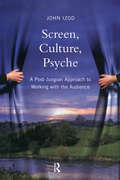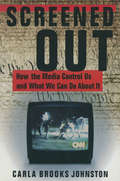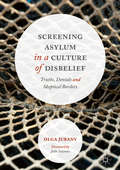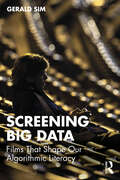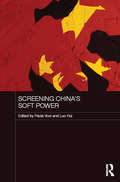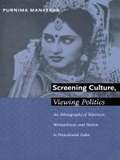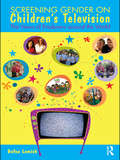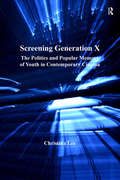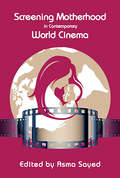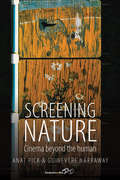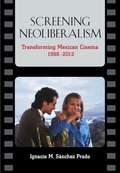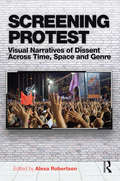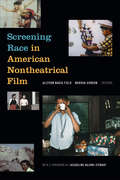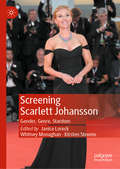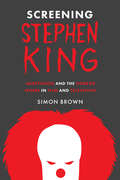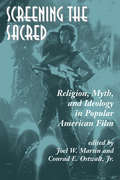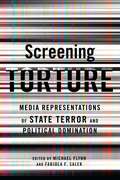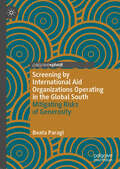- Table View
- List View
Screen Tastes: Soap Opera to Satellite Dishes
by Charlotte BrunsdonCharlotte Brundson's key writings on film and television are bought together with new introductions which contextualise and update the arguments. The focus is on the tastes and pleasures of the female consumer as she is produced by popular film and television.
Screen, Culture, Psyche: A Post Jungian Approach to Working with the Audience
by John IzodScreen, Culture, Psyche illuminates recent developments in Jungian modes of media analysis, and illustrates how psychoanalytic theories have been adapted to allow for the interpretation of films and television programmes, employing Post-Jungian methods in the deep reading of a whole range of films. Readings of this kind can demonstrate the way that some films bear the psychological projections not only of their makers but of their audience, and assess the manner in which films engage the writer’s own psyche. Seeking to go beyond existing theories, John Izod explores the question of whether Jungian screen analysis can work for ordinary filmgoers - can what functions for the scholar be said to be true for people without a background in Jung’s ideas? Through detailed readings of a number of films and programmes, John Izod builds on the work previously done by Jungian film analysts, and moves on to contemplate the level of audience engagement. Offering deep readings of films directed by Kubrick and Bernardo Bertolucci, as well as satirical comedy, documentaries and twenty-first century Westerns, the book explores the extent to which they manage to make the psychological impact on spectators that films of a similar kind have done on Jungian writers. The author concludes that the screen texts with the best likelihood of impacting the culture of the audience through their collective psychological force fall at opposite ends of the size and budget range: highly personal documentaries, and the most affecting of mainstream genre movies. This innovative text will be essential reading for psychoanalysts and therapists, as well as students and scholars of film with an interest in understanding how screen products work psychologically to engage the viewer.
Screen-Smart Parenting
by Tory Burch Jodi GoldAs a practicing child psychiatrist and mother of three, Jodi Gold has a unique understanding of both the mind-boggling benefits and the serious downsides of technology. Dr. Gold weaves together scientific knowledge and everyday practical advice to help you foster your child's healthy relationship to technology, from birth to the teen years. You'll learn: *How much screen time is too much at different ages. *What your kids and teens are actually doing in all those hours online. *How technology affects social, emotional, and cognitive development. *Which apps and games build smarts and let creativity shine. *How your own media habits influence your children. *What you need to know about privacy concerns, cyberbullying, and other dangers. *Ways to set limits that the whole family can live with.
Screened Out
by Jean Baudrillard Chris Turner'Watching the president's Christmas message produces this necropolar, white-mass sensation. Seeing the video broadcast of the Christmas service in the cathedral itself, with these pathetic screens and the young worshippers slumped around them here and there, you tell yourself that God and religion deserved better. Deserved to die, yes, but not this. However, watching the presidential figure and his sonorous inanity, you tell yourself that here at least you got what you deserved. Chirac is useless - that goes without saying - but so are we all ... Uselessness of this kind has no origin: it exists immediately, reciprocally; like a shared secret, you savour it implicitly - with its warm bitterness - particularly in these cold snaps, as the very essence of the social bond. Sanctioned by that other interactive uselessness - the uselessness of the screen.'World-renowned for his lively and often iconoclastic reading of contemporary culture and thought, Jean Baudrillard here turns his hand to topical political debates and issues. In this stimulating collection of journalistic essays Baudrillard addresses subjects ranging from those already established as his trademark (virtual reality, Disney, television) to more unusual topics such as the Western intervention in Bosnia, children's rights, Holocaust revisionism, AIDS, the Rushdie fatwa, Formula One racing, mad cow disease, genetic cloning, and the uselessness of Chirac. These are coruscating and intriguing articles, not least because they show that Baudrillard is - pace his critics - still susceptible and alert to influences from social movements and the world beyond the hyperreal.
Screened Out: How the Media Control Us and What We Can Do About it
by Carla B. JohnstonA comparison of the cultural and political/institutional dimensions of war's impact on Greece during the Peloponnesian War, and the United States and the two Koreas, North and South, during the Korean War. It demonstrates the many underlying similarities between the two wars.
Screened Out: Playing Gay in Hollywood from Edison to Stonewall
by Richard BarriosRapacious dykes, self-loathing closet cases, hustlers, ambiguous sophisticates, and sadomasochistic rich kids: most of what America thought it knew about gay people it learned at the movies. A fresh and revelatory look at sexuality in the Great Age of movie making, Screened Out shows how much gay and lesbian lives have shaped the Big Screen. Spanning popular American cinema from the 1900s until today, distinguished film historian Richard Barrios presents a rich, compulsively readable analysis of how Hollywood has used and depicted gays and the mixed signals it has given us: Marlene in a top hat, Cary Grant in a negligee, a pansy cowboy in The Dude Wrangler. Such iconoclastic images, Barrios argues, send powerful messages about tragedy and obsession, but also about freedom and compassion, even empowerment.Mining studio records, scripts, drafts (including cut scenes), censor notes, reviews, and recollections of viewers, Barrios paints our fullest picture yet of how gays and lesbians were portrayed by the dream factory, warning that we shouldn't congratulate ourselves quite so much on the progress movies - and the real world -- have made since Stonewall.Captivating, myth-breaking, and funny, Screened Out is for all film aficionados and for anyone who has sat in a dark movie theater and drawn strength and a sense of identity from what they saw on screen, no matter how fleeting or coded.
Screening Asylum in a Culture of Disbelief: Truths, Denials and Skeptical Borders
by Olga JubanyThis ethnographic book enhances our understanding of asylum screening, an area of immigration that is often overlooked and remains under-researched. Falsely perceived as a one-dimensional function of static state power, it is here revealed that asylum decisions at borders respond to a complex cultural construction, saturated by a meta-message of disbelief, denial and moral panics. The author demonstrates that immigration officers’ work patterns, behavior and decisions are informed by such stereotyping, which has led to asylum narratives being interpreted in the light of concepts of social acceptability and rejection. Establishing a parallel with law enforcement, the author argues that this process replicates a professional world of categorization and control, forged within an autonomous immigration service subculture. This timely work will appeal to students and scholars of migration studies, identity and ethnic studies, social anthropology, sociology, law and policy studies.>
Screening Big Data: Films That Shape Our Algorithmic Literacy
by Gerald SimThis book examines the influence of key films on public understanding of big data and the algorithmic systems that structure our digitally mediated lives.From star-powered blockbusters to civic-minded documentaries positioned to facilitate weighty debates about artificial intelligence, these texts frame our discourse and mediate our relationship to technology. Above all, they impact society’s abilities to regulate AI and navigate big tech’s political and economic maneuvers to achieve market dominance and regulatory capture. Foregrounding data politics with close readings of key films like Moneyball, Minority Report, The Social Dilemma, and Coded Bias, Gerald Sim reveals compelling ways in which films and tech industry–adjacent media define apprehension of AI. With the mid-2010s techlash in danger of fizzling out, Screening Big Data explores the relationship between this resistance and cultural infrastructure while highlighting the urgent need to refocus attention onto how technocentric media occupy the public imagination.This book will interest students and scholars of film and media studies, digital culture, critical data studies, and technopolitics.
Screening China's Soft Power (Media, Culture and Social Change in Asia)
by Paola Voci Luo HuiPromoting China's cultural soft power by disseminating modern Chinese values is one of the policies of President Xi Jinping. Although, it is usually understood as a top-down initiative, implemented willingly or unwillingly by writers, filmmakers, artists, and so on, and often manifesting itself in clumsy and awkward ways, for example, the concept of "the Chinese dream," intended to rival and perhaps appeal more strongly than "the American dream," modern Chinese values are in fact put forward in many ways by many different cultural actors. Through analyses of film festivals, CCTV, Confucius Institutes, auteurs, blockbusters, reality TV, and online digital cultures, this book exposes the limitations of China's officially promoted soft power in both conception and practice, and proposes a pluralistic approach to understanding Chinese soft power in local, regional, and transnational contexts. As such, the book demonstrates the limitations of existing theories of soft power, and argues that the US-derived concept of soft power can benefit from being examined from a China perspective.
Screening Culture, Viewing Politics: An Ethnography of Television, Womanhood, and Nation in Postcolonial India
by Purnima MankekarIn Screening Culture, Viewing Politics Purnima Mankekar presents a cutting-edge ethnography of television-viewing in India. With a focus on the responses of upwardly-mobile, yet lower-to-middle class urban women to state-sponsored entertainment serials, Mankekar demonstrates how television in India has profoundly shaped women's place in the family, community, and nation, and the crucial role it has played in the realignment of class, caste, consumption, religion, and politics. Mankekar examines both "entertainment" narratives and advertisements designed to convey particular ideas about the nation. Organizing her study around the recurring themes in these shows--Indian womanhood, family, community, constructions of historical memory, development, integration, and sometimes violence--Mankekar dissects both the messages televised and her New Delhi subjects' perceptions of and reactions to these messages. In the process, her ethnographic analysis reveals the texture of these women's daily lives, social relationships, and everyday practices. Throughout her study, Mankekar remains attentive to the tumultuous historical and political context in the midst of which these programs' integrationalist messages are transmitted, to the cultural diversity of the viewership, and to her own role as ethnographer. In an enlightening epilogue she describes the effect of satellite television and transnational programming to India in the 1990s. Through its ethnographic and theoretical richness, Screening Culture, Viewing Politics forces a reexamination of the relationship between mass media, social life, and identity and nation formation in non-Western contexts. As such, it represents a major contribution to a number of fields, including media and communication studies, feminist studies, anthropology, South Asian studies, and cultural studies.
Screening Fears: On Protective Media
by Francesco CasettiA historical and theoretical investigation of the unexpected ways screen-based media protect and excite viewers’ fears and anxieties of the worldIn this brilliant contribution to contemporary media studies, acclaimed theorist Francesco Casetti advances a provocative hypothesis: instead of being prostheses that expand or extend our perceptions, modern screen-based media are in fact apparatuses that shelter and protect us from exposure to the world. Rather than bringing us closer to external reality, dominant forms of visual media function as barriers or enclosures that defend against the apparent threats and dangers that seem increasingly to surround us. Working with an original historical overview that begins with the Phantasmagoria of the late eighteenth century, then the shared interior spaces of the movie theater in the early to mid-twentieth century, and finally the solitary digital milieus of the present, Casetti traces the outlines of the protective “bubbles” that disconnect us from our immediate surroundings. To be provided with a shield of immunity to the hazards and uncertainties of the world while experiencing them at a safe remove might seem a positive development. But, he asks, what if these media, instead of providing invulnerability, ensnare individuals in a suffocating enclosure? What if, in their effort to keep reality under control, they exercise a violence equal to that of the dangers they resist? In a dialectical exercise, and through a vivid range of cultural artifacts, Screening Fears traces the emergence of modern protective media and the way they changed our forms of mediation with the world in which we live.
Screening Gender on Children's Television: The Views of Producers around the World
by Dafna LemishScreening Gender on Children’s Television offers readers insights into the transformations taking place in the presentation of gender portrayals in television productions aimed at younger audiences. It goes far beyond a critical analysis of the existing portrayals of gender and culture by sharing media professionals’ action-oriented recommendations for change that would promote gender equity, social diversity and the wellbeing of children. Incorporating the author’s interviews with 135 producers of children’s television from 65 countries, this book discusses the role television plays in the lives of young people and, more specifically, in developing gender identity. It examines how gender images presented to children on television are intertwined with important existential and cultural concerns that occupy the social agenda worldwide, including the promotion of education for girls, prevention of HIV/AIDS and domestic violence and caring for ‘neglected’ boys who lack healthy masculine role models, as well as confronting the pressures of the beauty myth. Screening Gender on Children’s Television also explores how children’s television producers struggle to portray issues such as sex/sexuality and the preservation of local cultures in a profit-driven market which continually strives to reinforce gender segregation. The author documents pro-active attempts by producers to advance social change, illustrating how television can serve to provide positive, empowering images for children around the world. Screening Gender on Children’s Television is an accessible text which will appeal to a wide audience of media practitioners as well as students and scholars. It will be useful on a range of courses, including popular culture, gender, television and media studies. Researchers will also be interested in the breadth of this cross-cultural study and its interviewing methodology.
Screening Generation X: The Politics and Popular Memory of Youth in Contemporary Cinema
by Christina LeeScreening Generation X: The Politics and Popular Memory of Youth in Contemporary Cinema examines popular representations of Generation X in American and British film. In arguing that the various constructions of youth are marked by major cultural shifts and societal inequalities, it analyzes the iconic 'Gen X' figures ranging from the slacker, the teenage time traveller, and third wave feminists, to the oeuvre of Molly Ringwald and Richard Linklater. This book explores the important cultural work performed by films that mediate the experiences of Generation X and critiques the ongoing marginalization of the youth who struggle to find their identity and a voice in increasingly unstable times. Specific analyses of such films as Pump Up the Volume, The Breakfast Club, Heathers, Donnie Darko and Waking Life are used to illustrate the research.
Screening Motherhood in Contemporary World Cinema
by Asma SayedUsing a variety of critical and theoretical approaches, the contributing scholars to this collection analyze culturally specific and globally held attitudes about mothers and mothering, as represented in world cinema. Examining films from a range of countries including Afghanistan, India, Iran, Eastern Europe, Canada, and the United States, the various chapters contextualize the socio-cultural realities of motherhood as they are represented on screen, and explore the maternal figure as she has been glamorized and celebrated, while simultaneously subjected to public scrutiny. Collectively, this scholarly investigation provides insights into where women’s struggles converge, while also highlighting the dramatically different realities of women around the globe.
Screening Nature: Cinema beyond the Human
by Anat Pick and Guinevere NarrawayEnvironmentalism and ecology are areas of rapid growth in academia and society at large. Screening Nature is the first comprehensive work that groups together the wide range of concerns in the field of cinema and the environment, and what could be termed “posthuman cinema.” It comprises key readings that highlight the centrality of nature and nonhuman animals to the cinematic medium, and to the language and institution of film. The book offers a fresh and timely intervention into contemporary film theory through a focus on the nonhuman environment as principal register in many filmic texts. Screening Nature offers an extensive resource for teachers, undergraduate students, and more advanced scholars on the intersections between the natural world and the worlds of film. It emphasizes the cross-cultural and geographically diverse relevance of the topic of cinema ecology.
Screening Neoliberalism: Transforming Mexican Cinema, 1988-2012
by Ignacio M. Sanchez PradoCavernous, often cold, always dark, with the lingering smell of popcorn in the air: the experience of movie-going is universal. The cinematic experience in Mexico is no less profound, and has evolved in complex ways in recent years. Films like Y Tu Mama Tambien, El Mariachi, Amores Perros, and the work of icons like Guillermo del Toro and Salma Hayek represent much more than resurgent interest in the cinema of Mexico. In Screening Neoliberalism, Ignacio Sanchez Prado explores precisely what happened to Mexico's film industry in recent decades. Far from just a history of the period, Screening Neoliberalism explores four deep transformations in the Mexican film industry: the decline of nationalism, the new focus on middle-class audiences, the redefinition of political cinema, and the impact of globalization. This analysis considers the directors and films that have found international notoriety as well as those that have been instrumental in building a domestic market. Screening Neoliberalism exposes the consequences of a film industry forced to find new audiences in Mexico's middle-class in order to achieve economic and cultural viability.
Screening Protest: Visual narratives of dissent across time, space and genre
by Alexa RobertsonScreening Protest brings together a range of scholarly perspectives on the study of protest mediations on television and in film. Arguing that the screen is a fruitful, if overlooked, analytical focus, the book explores how visual narratives of protest wander across borders – territorial, temporal and generic. Chapters compare coverage of major protests in recent history by global news channels like Al Jazeera English, BBC World, CNN International and RT. They consider how geopolitical agendas, newsroom culture and the ubiquity of eyewitness footage shape the narration of events such as the ‘Umbrella Revolution’ in Hong Kong, anti-austerity protests in Greece, pro-EU mobilizations in the Ukraine and clashes in Ferguson. A focus on narrative allows authors to compare such news stories with popular cultural depictions of the protester, in films and television series such as The Hunger Games, Robin Hood and Suffragette. Although focussed on the screen, the scope of the book is broad, given its exploration of images distributed worldwide. Written with both scholars and students in mind, Screening Protest will interest researchers in political science, sociology, media and film studies, as well as the general reader interested in current affairs.
Screening Race in American Nontheatrical Film
by Allyson Nadia Field Marsha GordonAlthough overlooked by most narratives of American cinema history, films made for purposes outside of theatrical entertainment dominated twentieth-century motion picture production. This volume adds to the growing study of nontheatrical films by focusing on the ways filmmakers developed and audiences encountered ideas about race, identity, politics, and community outside the borders of theatrical cinema. The contributors to Screening Race in American Nontheatrical Film examine the place and role of race in educational films, home movies, industry and government films, anthropological films, and church films as well as other forms of nontheatrical filmmaking. From filmic depictions of Native Americans and films by 1920s African American religious leaders to a government educational film about the unequal treatment of Latin American immigrants, these films portrayed—for various purposes and intentions—the lives of those who were mostly excluded from the commercial films being produced in Hollywood. This volume is more than an examination of a broad swath of neglected twentieth-century filmmaking; it is a reevaluation of basic assumptions about American film culture and the place of race within it. Contributors. Crystal Mun-hye Baik, Jasmyn R. Castro, Nadine Chan, Mark Garrett Cooper, Dino Everett, Allyson Nadia Field, Walter Forsberg, Joshua Glick, Tanya Goldman, Marsha Gordon, Noelle Griffis, Colin Gunckel, Michelle Kelley, Todd Kushigemachi, Martin L. Johnson, Caitlin McGrath, Elena Rossi-Snook, Laura Isabel Serna, Jacqueline Najuma Stewart, Dan Streible, Lauren Tilton, Noah Tsika, Travis L. Wagner, Colin Williamson
Screening Scarlett Johansson: Gender, Genre, Stardom
by Whitney Monaghan Kirsten Stevens Janice LoreckScreening Scarlett Johansson: Gender, Genre, Stardom provides an account of Johansson’s persona, work and stardom, extending from her breakout roles in independent cinema, to contemporary blockbusters, to her self-parodying work in science-fiction. Screening Scarlett Johansson is more than an account of Johansson’s career; it positions Johansson as a point of reference for interrogating how femininity, sexuality, identity and genre play out through a contemporary woman star and the textual manipulations of her image. The chapters in this collection cast a critical eye over the characters Johansson has portrayed, the personas she has inhabited, and how the two intersect and influence one another. They draw out the multitude of meanings generated through and inherent to her performances, specifically looking at processes of transformation, metamorphosis and self-deconstruction depicted in her work.
Screening Sex
by Linda WilliamsFor many years, kisses were the only sexual acts to be seen in mainstream American movies. Then, in the 1960s and 1970s, American cinema "grew up" in response to the sexual revolution, and movie audiences came to expect more knowledge about what happened between the sheets. In Screening Sex, the renowned film scholar Linda Williams investigates how sex acts have been represented on screen for more than a century and, just as important, how we have watched and experienced those representations. Whether examining the arch artistry of Last Tango in Paris, the on-screen orgasms of Jane Fonda, or the anal sex of two cowboys in Brokeback Mountain, Williams illuminates the forms of pleasure and vicarious knowledge derived from screening sex.Combining stories of her own coming of age as a moviegoer with film history, cultural history, and readings of significant films, Williams presents a fascinating history of the on-screen kiss, a look at the shift from adolescent kisses to more grown-up displays of sex, and a comparison of the "tasteful" Hollywood sexual interlude with sexuality as represented in sexploitation, Blaxploitation, and avant-garde films. She considers Last Tango in Paris and Deep Throat, two 1972 films unapologetically all about sex; In the Realm of the Senses, the only work of 1970s international cinema that combined hard-core sex with erotic art; and the sexual provocations of the mainstream movies Blue Velvet and Brokeback Mountain. She describes art films since the 1990s, in which the sex is aggressive, loveless, or alienated. Finally, Williams reflects on the experience of screening sex on small screens at home rather than on large screens in public. By understanding screening sex as both revelation and concealment, Williams has written the definitive study of sex at the movies.Linda Williams is Professor of Film Studies and Rhetoric at the University of California, Berkeley. Her books include Porn Studies, also published by Duke University Press; Playing the Race Card: Melodramas of Black and White from Uncle Tom to O. J. Simpson; Viewing Positions: Ways of Seeing Film; and Hard Core: Power, Pleasure, and the "Frenzy of the Visible."A John Hope Franklin Center BookNovember424 pages129 illustrations6x9 trim sizeISBN 0-8223-0-8223-4285-5paper, $24.95ISBN 0-8223-0-8223-4263-4library cloth edition, $89.95ISBN 978-0-8223-4285-4paper, $24.95ISBN 978-0-8223-4263-2library cloth edition, $89.95
Screening Social Justice: Brave New Films and Documentary Activism
by Sherry B. OrtnerIn Screening Social Justice, award-winning anthropologist Sherry B. Ortner presents an ethnographic study of Brave New Films, a nonprofit film production company that makes documentaries intended to mobilize progressive grassroots activism. Ortner positions the work of the company within a tradition of activist documentary filmmaking and within the larger field of “alternative media” that is committed to challenging the mainstream media and telling the truth about the world today. The company’s films cover a range of social justice issues, with particular focus on the hidden workings of capitalism, racism, and right-wing extremism. Beyond the films themselves, Brave New Films is also famous for its creative distribution strategies. All of the films are available for free on YouTube. Central to the intention of promoting political activism, the films circulate through networks of other activist and social justice organizations and are shown almost entirely in live screenings in which the power of the film is amplified. Ortner takes the reader inside both the production process and the screenings to show how a film can be made and used to mobilize action for a better world.
Screening Stephen King: Adaptation and the Horror Genre in Film and Television
by Simon Brown&“Gathers together the unruly mess of King adaptations . . . And places it within the sociocultural and industrial context of four decades of horror.&” —Philip L. Simpson, author of Psycho Paths Starting from the premise that Stephen King has transcended ideas of authorship to become his own literary, cinematic, and televisual brand, Screening Stephen King explores the impact and legacy of over forty years of King film and television adaptations. Simon Brown first examines the reasons for King&’s literary success and then, starting with Brian De Palma&’s Carrie, explores how King&’s themes and style have been adapted for the big and small screens. He looks at mainstream multiplex horror adaptations from Cujo to Cell, low-budget DVD horror films such as The Mangler and Children of the Corn franchises, non-horror films, including Stand by Me and The Shawshank Redemption, and TV works from Salem&’s Lot to Under the Dome. Through this discussion, Brown identifies what a Stephen King film or series is or has been, how these works have influenced film and TV horror, and what these influences reveal about the shifting preoccupations and industrial contexts of the post-1960s horror genre in film and TV. &“Well-written . . . It really is the most exhaustive analysis of Stephen King on the screen that has ever been written.&” —Cinepunx &“This book is not only essential as a study of Stephen King and his works adapted to the big and small screen; it is also an exemplary study of the evolution of the horror genre in its ebb and flow from literary adaptation to gore-laden saturation and beyond since the mid-1970s.&” —Sorcha Ní Fhlainn, author of Postmodern Vampires
Screening The Sacred: Religion, Myth, And Ideology In Popular American Film
by Joel MartinWhat are the religious impulses in the 1976 film Rocky, and how can they work to shape one's social identity? Do the films Alien and Aliens signify the reemergence of the earth goddess as a vital cultural power? What female archetypes, borne out of male desire, inform the experience of women in Nine and a Half Weeks?These are among the several compelling questions the authors of this volume consider as they explore the way popular American film relates to religion. Oddly, religion and film?two pervasive elements of American culture?have seldom been studied in connection with each other. In this first systematic exploration, the authors look beyond surface religious themes and imagery in film, discovering a deeper, implicit presence of religion. They employ theological, mythological, and social and political criticism to analyze the influence of religion, in all its rich variety and diversity, on popular film. Perhaps more importantly, they consider how the medium of film has helped influence and shape American religious culture, secular or otherwise.More than a random collection of essays, this volume brings to the study of religion and film a carefully constructed analytic framework that advances our understanding of both. Screening the Sacred provides fresh and welcome insight to film criticism; it also holds far-reaching relevance for the study of religion. Progressive in its approach, instructive in its analyses, this book is written for students, scholars, and other readers interested in religion, popular film, and the impact of each on American culture.
Screening Torture: Media Representations of State Terror and Political Domination
by Michael Flynn Fabiola Fernandez SalekBefore 9/11, films addressing torture outside of the horror/slasher genre depicted the practice in a variety of forms. In most cases, torture was cast as the act of a desperate and depraved individual, and the viewer was more likely to identify with the victim rather than the torturer. Since the terrorist attacks of September 11, 2001, scenes of brutality and torture in mainstream comedies, dramatic narratives, and action films appear for little other reason than to titillate and delight. In these films, torture is devoid of any redeeming qualities, represented as an exercise in brutal senselessness carried out by authoritarian regimes and institutions.This volume follows the shift in the representation of torture over the past decade, specifically in documentary, action, and political films. It traces and compares the development of this trend in films from the United States, Europe, China, Latin America, South Africa, and the Middle East. Featuring essays by sociologists, psychologists, historians, journalists, and specialists in film and cultural studies, the collection approaches the representation of torture in film and television from multiple angles and disciplines, connecting its aesthetics and practices to the dynamic of state terror and political domination.
Screening by International Aid Organizations Operating in the Global South: Mitigating Risks of Generosity
by Beata ParagiAid organizations usually embrace the idea of digitalization, both in terms of using diverse technologies and processing data digitally for improving their services, making their operations more efficient and even mitigating various risks. While digital fundraising, the use of biometric ID systems or digitalized cash and voucher assistance enjoys widespread attention both in academic and practitioner circles, it is less known how aid organizations navigate between counterterrorism legislations and data protection laws in technical terms. Limiting the discussion to the EU General Data Protection Regulation and by conceptualizing screening — commonly used to prevent the use of donor money for illicit purposes, money-laundering, terrorism finance or corruption — as a data processing operation conducted by larger international aid organizations operating in the Global South, this book focuses on the matter of ‘transparency’ and ‘right to information’ being at the nexus ofsurveillance studies and privacy studies. By means of legal and social science methods, it simultaneously explores screening in light of classic surveillance and analyses whether opacity around screening by NGOs (data controllers) is in line with the spirit of European Union data protection regime from the perspective of individuals (data subjects). In so doing, Paragi also contributes to the discussion on the politics of transparency and highlights the dilemmas and challenges aid organizations operating in authoritarian regimes or conflict settings may face.

